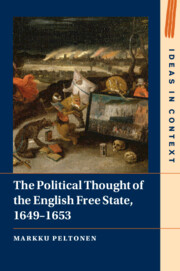Book contents
- The Political Thought of the English Free State, 1649–1653
- Ideas in Context
- The Political Thought of the English Free State, 1649–1653
- Copyright page
- Dedication
- Contents
- Acknowledgements
- Introduction
- Chapter 1 Changing the Form of Government
- Chapter 2 Anti-monarchism
- Chapter 3 The Free State
- Chapter 4 Aristocracy
- Chapter 5 Democracy
- Epilogue
- Bibliography
- Index
Chapter 5 - Democracy
Published online by Cambridge University Press: 13 October 2022
- The Political Thought of the English Free State, 1649–1653
- Ideas in Context
- The Political Thought of the English Free State, 1649–1653
- Copyright page
- Dedication
- Contents
- Acknowledgements
- Introduction
- Chapter 1 Changing the Form of Government
- Chapter 2 Anti-monarchism
- Chapter 3 The Free State
- Chapter 4 Aristocracy
- Chapter 5 Democracy
- Epilogue
- Bibliography
- Index
Summary
Chapter 5 turns to the democratic defences of the free state. Whereas the aristocratic portrayals began immediately after the establishment of the free state, a democratic argument for the free state started to be developed only towards the end of 1649. Soon, however, numerous pamphleteers argued that the free state was a democracy, and, for them, it was a good thing too. This is one of the first times in early-modern European political thought that democracy was openly defended as a viable constitutional form. The aristocrats saw the free state as a golden mean between monarchy and democracy, but the democrats distinguished between a good and bad democracy and argued that their constitutional preference was a good democracy, which was a mean between monarchy and a bad democracy or anarchy. Moreover, both sides wrote in support of the free state and thus defended the supremacy of a unicameral representative institution. For the democrats, a bad democracy was the people’s direct rule, but a good democracy was based on a representative institution. The upshot is that this was the first time in the history of political thought that democracy was conceived in representative terms.
- Type
- Chapter
- Information
- The Political Thought of the English Free State, 1649–1653 , pp. 181 - 221Publisher: Cambridge University PressPrint publication year: 2022

